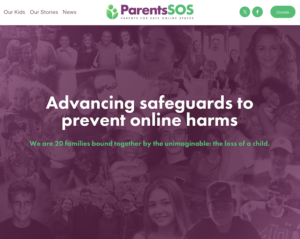Refuse to Use is a world-wide Movement by responsible and futuristic thinking parents and teachers to ban all school-based technology for children under 12 years of age, and bring back tried and true methods of teaching. The 0-12 years are formative for brain and body development, and are a fragile time when deprivation and damage can be permanent. Four critical factors for enhancing child development, behaviour, and learning are movement, touch, connection, and nature. Technology stops children from engagement in these critical factors. Technology is sedentary, isolating, overstimulating, and results in child neglect, causing delays in child development, problematic and difficult to manage behaviours, as well as limited attention and learning ability. Teachers teach, not technology. Join the Refuse to Use Movement by reading “Ten reasons to NOT use technology in schools for children under the age of 12 years”, and signing below petition to show your support.
- They don’t need it. In fact, education technology appears to be doing more harm than good in the areas of literacy and overall academic performance. If education technology is so great, why has Canada dropped out the top 10 to 13th, and the US is ranked 27th on the PISA, a global test for math, science, and reading (PISA 2013)? Half of grade eight students do not demonstrate job entry literacy (National Center for Education Statistics 2010). Use it or you lose it rings true with today’s fast paced technology, which doesn’t appear to require frontal lobe activity, causing atrophy in the very area of the brain that should be growing (Dunckley V 2014). Termed the ‘Learning Paradox’ e.g. the more you use it, the less likely you are to learn, indicates that today’s students are quite possibly only as smart as their device.
- Not research evidenced. While education technology holds promise for the future, too much too soon has been shown to have perilous consequences. While every parent would like their child to grow up with the knowledge and skills needed to be successful as an adult, pushing apps around a screen at one year of age, is likely to result in exactly the opposite. The face of technology will change significantly over the next 5-10 years. Teaching tech to toddlers now, is senseless and vastly detrimental to the developing brain and body.
- It’s not proven to be safe.Children are being forced by schools to absorb potentially harmful radiation without choice or parental consent. In 2011, the World Health Organization classified radiation emitted from technology devices, including lap tops, cell phones, tablets, wifi, routers, to be a Class 2B carcinogen (WHO 2011). Health Canada followed with warnings to parents to use “precautionary measures” regarding technology use, and to not allow children under 12 to carry cell phones in their pockets. In 2013, the American Academy of Pediatrics requested the Federal Trade Commission to reinvestigate radiation effects on children, citing thinner skulls, more aqueous brain tissue, and rapidly dividing cells (AAP 2013). Recent research suggests that the electromagnetic (EMF) and radio frequency (RF) radiation emissions from cell phones and laptops are causing reduction in sperm motility and sperm DNA fragmentation (Avendano 2012) as well as acoustic neuromas (Hardell 2013). Without long term data demonstrating safety, continuing to expose children to devices categorized as possible carcinogens, seems beyond all common sense or reason, and is an infringement of individual right and freedom from harm. Would schools continue in this manner, if they were to be held personally responsible for their actions? School wifi waver forms can be found at Citizens for Safe Technology website.
- Pediatrician guidelines actively ignored. Both the American Academy of Pediatrics and the Canadian Pediatric Society released policy stating the following limits: no technology exposure for 0-2 years, 1 hour/day for 3-5 years, and 2 hours/day 6-18 years, yet the average child uses 4-5 times that amount of entertainment technology before they even get to school (AAP 2014). Additional school-based education technology usage is estimated to average 2-3 hours per day. How can this happen? Teachers, school boards, parent advisory committees…right on up to the highest levels of education government have not only sanctioned escalating usage, but are encouraging it. To actively ignore policy put in place by two of the world’s largest pediatric organizations who represent all the pediatricians in North America, is not only unethical and unprofessional, but could in the near future, be considered an indictable offence.
- Sedentary bodies can’t learn.Research abounds that exercise enhances attention and learning (Ratey J 2008), yet schools continue to restrict movement through recess reduction and boring playgrounds. Yet…provision of sedentary, expensive, and useless technology explodes. As sedentary lifestyles become the norm, developmental delay and obesity escalate, right along with inability to pay attention and learn.
- Highly anxious children can’t learn. Anxiety is the fastest growing child mental illness. Technology isolates children from not only the attentions of parent and teacher, but also from potential cooperative learning with other students. Immersion in a virtual world that is fast paced, immediate, “me” focused, reward-based, and totally in the student’s control, causes immense transition difficulties back into the real world. Waiting, taking turns, and socializing with other children, are feared and difficult for the tech immersed child. Poor self-regulation, tantrums, impulsivity, aggression, and explosive violence in North American children are now the norm. Selfie was the 2013 word of the year.
- Impossible to manage and monitor. A Los Angeles school had to recall all its iPads from students as it couldn’t keep them from accessing porn, video games, facebooking and texting. Teachers and parents like to console themselves by thinking children are doing their homework. Well…they aren’t. 95% of time children spend on tech devices is for mindless entertainment purposes, not education.
- Highly addictive. A 2009 study indicated 1 out of 11 children aged 8-18 years are addicted to technology (Gentile D 2009). Never in the history of humankind have there been child addictions. Difficult and expensive to treat, in the near future, this will be the job of every health and education professional…addressing student tech addictions. Schools wouldn’t give children cocaine or crack, yet they readily hand out an equally as damaging and addictive device to students on a daily basis. Starting now to restrict usage in school settings, would send a message to students and parents that it is imperative to reduce the use of technology, before it’s too late.
- Displaces the basics. Remember the 3 R’s – reading, writing and arithmetic? Teaching printing is passé, and reading and math instruction are increasingly relegated to 2-dimentional screens. Yet whenever a child is tested prior to age 12 years, on any subject, they’re expected to be proficient with printing. When children learn to print, they create a visual memory for later letter recognition for reading. When they practice printing over and over, their printing speeds get fast, allowing them to free up their brains for spelling, sentence production, and math. Not teaching children to print ensures illiteracy and academic failure. If adults were told to print all day every day in a foreign language, but not given proper instruction or teaching, how long would they continue this insane task? Students who do not demonstrate subconscious motor planning for letters and numbers by grade 3, are very slow printers, hate school, and resist all subjects requiring printing output.
- Not sustainable. The ways in which parents and teachers are raising and educating children with technology are not sustainable. It’s time to bring the tech train back to the station and rethink who, what, when, where, why and how parameters to safely and effectively use technology with children. Join the Refuse to Use Movement petition below to stop use of school-based technology with children under the age of 12 years until such time as research indicates safety and efficacy.
[emailpetition id=”2″]
Referenced research can be located on Zone’in Fact Sheet now available in English and Spanish versions.
Cris Rowan is a pediatric occupational therapist, biologist, speaker and author of “Virtual Child – The terrifying truth about what technology is doing to children”. Cris can be reached at info@zonein.ca.





8 Responses
I believe that there is a much more important reason to refrain from using technology too early. Use of the technology precludes development of the very skills needed to build technology.
Being knowledgeable about technology can take two forms. The obvious one addressed by the article is being knowledgeable in using technology. This is not difficult to teach. The second, which is far more important to me, is knowing how to build technology. The problem with using technology too soon is that it displaces the skills necessary to build technology.
Let’s think about a simple calculator. How can someone possibly figure out how to build a calculator if they do not know the procedures used to solve mathematical problems? This is needed for two reasons. First, it is the basic function of the calculator, and knowing the steps to program the calculator to perform requires knowing the steps for solving mathematical problems. If you don’t know how to calculate a square root on paper, how can you possibly write the Assembly code that tells a calculator how to do it? Second, every operation performed within the calculator’s microcontroller happens through either moving a series of binary digits into a register, or adding a series of binary digits to those already in the register. When programming a microcontroller at the Assembly language level, the programmer is deciding, step by step, what goes in each register when. So, it is not just the sequence of steps that requires knowing the mathematical operations, but understanding how to code those steps requires understanding yet another set of mathematical operations.
Think about a GPS, or Mapquest. To know how to build a GPS or write the software for Mapquest, the programmer needs to know how to read and understand the information on a map. If the programmer cannot figure out how to get from point A to point B on a paper map, as well as the distance for each leg of the trip, that programmer is completely incapable of contributing to building a GPS or writing Mapquest.
So, in order to know how to build technology, one must know how to do things without technology, and then how to adapt that knowledge to the way technology works.
I want our kids to be technology savvy in knowing how to build the technology, not just use it.
I absolutely believe this is true. I see young children..very young…grabbing for their parents phones in public places. (not that the parents should be using phones in public places..it is RUDE) teens are not interacting…they are texting one another. Personally, I think tech. is very seductive for everyone…I use it, obviously, and I have to make a concerted effort to limit myself from just emails, surfing interests and texting at times….but, I am very glad to have been brought up in an era, where people interacted and learned from all their experiences..and nurturing…does this exist in most families today. I am not so sure!
Thank you for this much needed initiative to educate parents and educators about the adverse effects of these technologies. As a health researcher/educator and a mother I am most concerned about the long-term impact on physical and mental health of children raised on devices, particularly about microwave radiation exposure associated with wireless-enabled devices like iPads.
I am a therapist specializing in Internet and video game addiction. The men I work with at our retreat center have usually been handed devices since they were about 5 or 6. Even the most well-intentioned parents did not know how much to limit tech use and how to do it effectively. The result: adult children (we work with males only) who show a common cluster of dysfunctional characteristics. To learn more about this cluster, read i-Disorder, by Larry Rosen. We can confirm his findings. These computer addicted young men are often dependent, socially anxious, avoidant of responcibility and hard work, uncomfortable when dealing with the real world, and isolated. Many have never dated and most are both sleep deprived and out of shape. Many of them are lacking basic life skill habits, like cooking, cleaning, and making sure their hygiene is good.
So, I agree with Cris Rowan’s blog and encourage all who read it to follow her excellent advise. And, the younger your child, the more helpful will be your intervention.
Hilarie
Hilarie…what are the origins of addiction, and what can parents of young children do to guide their children away from this life long affliction?
Hi Hilarie, I need help with my two adolescent boys. They are both addicted. Between the computer, the phones and the xbox, I spend so much time arguing with them to unplug. We have rules and limits but like other kinds of addicts, they find ways around them. I am so worried for them. My 15 year old never really had friends. Now he has no interest with even bothering. It makes me cry. My 13 yr old was always very social but now he would prefer to play with friends online, than in person. Thank god for my daughter. She still likes barbie dolls and stuffed animals. I need advise on how to combat this monster. Thank you for any help you can offer.
Hello, Pam,
Please feel free to call me to discuss your situation. 800.682.6934. At the moment, the reSTART Center (www.netaddictionrecovery.com) offers a 45-90 day unplug retreat only for adults, so, sending them to us for detox is not an option. But, there are certainly alternatives. You might start by working with a parent coach who understands Internet addiction. I can suggest 2 whom I know well. They are both in the LA area and work by phone. One is co-author with me of Video Games and Your Kids: How Parents Stay in Control. This is a book written for parents like you, struggling to manage tech use in the home. Her name is Kim McDaniel, MA and her number is 425. 208.1385. The other is Chris Mulligen, MSW, and his number is 310 287-1640. Cris Rowan may do this sort of coaching as well; I don’t know.
If the situation does not improve with simple coaching, then you may want to consider something like sending them to an adolescent wilderness program or a therapeutic boarding school. You can research these at NATSAP.org. And, if you are willing to hire the services of an Educational Consultant, they can help find an appropriate placement. reSTART has been visited by several of these folks, so, if you ask me, I can give you a few names of EC’s that I am confident understand the problem. Hopefully, this increased level of intervention won’t be necessary.
Warmly,
Hilarie Cash, PhD
Hi Cris,
I think you were my nephew’s OT when they lived in Sechelt. Interesting how our worlds collide! I’ve started my own petition, asking that common sense math be reinstated into schools. You can check out my petition and other tidbits on the WISE Math BC facebook site, or lots of terrific info under the WISE Math banner at http://www.wisemath.org.
I have signed your petition. All the best with this initiative, you are on to something here. I completely disagree with computers in our children’s schools, and need to follow effective, cognitive research to determine what works best for our kids. All the best.
Sincerely,
Tara Houle